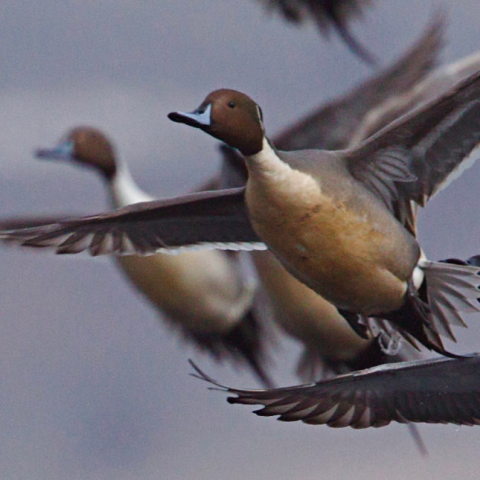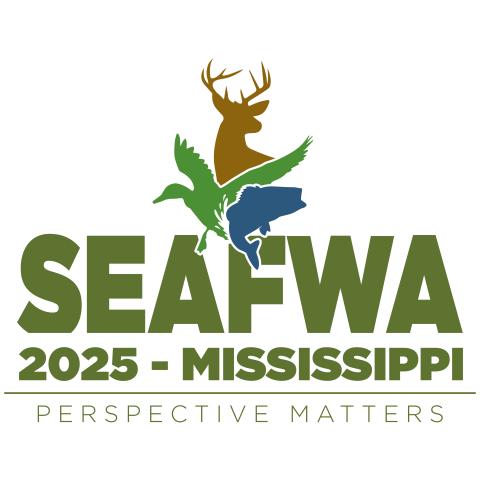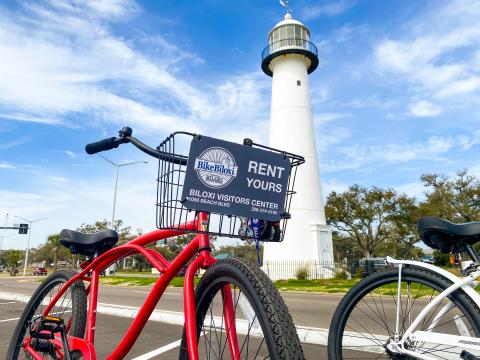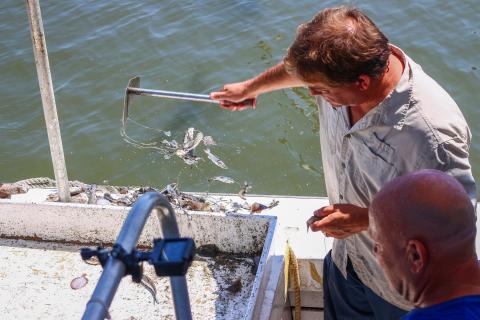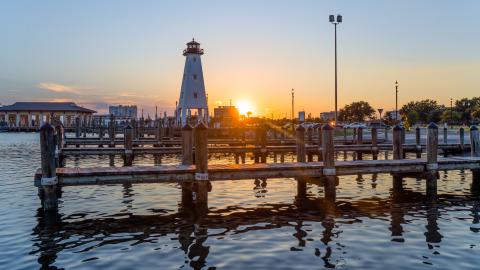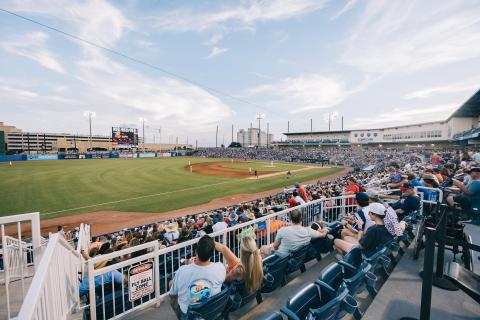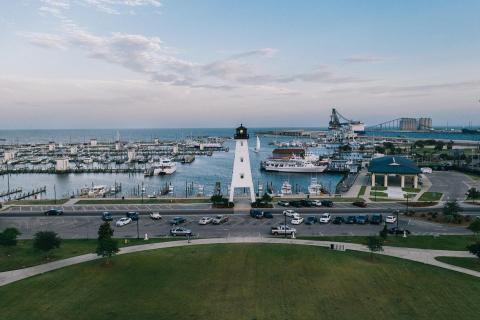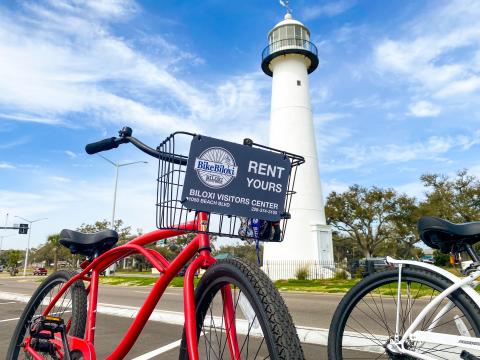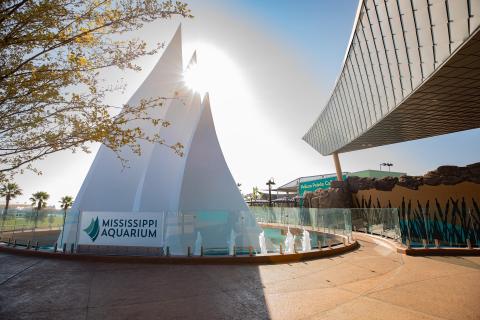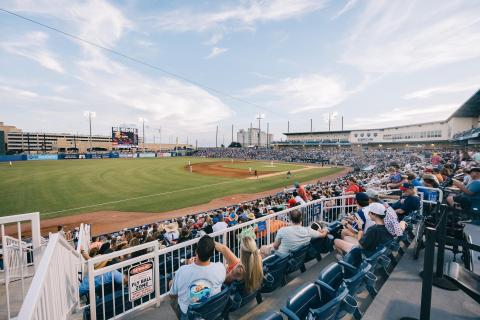Thank you for joining us!
Find the 80th Annual Conference under the Events tab in the top menu for next year's details.
This event has passed. The following information is here for reference only.
OCTOBER 26-29, 2025 | BILOXI, MISSISSIPPI
The 79th Annual Conference is hosted by the Mississippi Department of Wildlife, Fisheries and Parks.
The Annual Conference of the Southeastern Association of Fish and Wildlife Agencies is a forum for the exchange of ideas and critical information regarding the management and protection of fish and wildlife resources primarily in the southeast. The conference attracts over 500 representatives from state and federal agencies, citizens' organizations, universities, private wildlife research groups, fisheries and wildlife scientists, agency enforcement personnel, and other natural resource-related organizations.
Visit the Announcements/Important Dates section for updates.
Loading...
Announcements & Important Dates
- Special Symposia Announced! Click "Special Symposia" to the left to view.
- Call for Presentation Abstracts: CLOSED
- Call for Related Meeting Content: CLOSED
- Call for Organized Symposia: CLOSED
Attendee Registration is CLOSED!
This event has passed. The following information is here for reference only.
Find details on the 80th Annual Conference in the top 'Events' menu!
Attendees have multiple registration options, including Full Conference, One-Day, and student pricing.
Full Registration (Monday - Wednesday): $475
Sunday Only Registration
Monday OR Tuesday Only Registration: $275
Wednesday Only Registration: $150
Student: $250
Guest Ticket for Sunday Welcome Social: $65
Guest Ticket for Tuesday Awards Banquet: $80
If you have any questions about registration, please contact info@delaneymeetingevent.com or (802) 865- 5202.
Cancellation Policy: Registrations canceled by October 13, 2025, will receive a refund minus a $50 administrative fee. Cancellations after October 13th will not receive any refund due to obligations that SEAFWA has committed to with caterers and event contractors.
Location & Lodging Information
This event has passed. The following information is here for reference only.
Find details on the 80th Annual Conference in the top 'Events' menu!
Host Hotel
The Beau Rivage IS sold out!
Additional lodging is available at the Hard Rock Hotel next door, and the Doubletree Hotel a few blocks away. See below!
Hard Rock Hotel & Casino Biloxi
777 Beach Blvd, Biloxi, Mississippi, United States, 39530
1-228-374-7625
Doubletree Hotel Biloxi
940 Beach Blvd. Biloxi, MS 39530
+1 228-546-3100
Beau Rivage Amenities:
- Eat traditional seafood at Coraline’s
- Grab a drink and appetizers at The Daiquiri Shop
- Relax and treat yourself at the Spa & Salon
- Enjoy a drink and music at Eight75
- Swing into fun at the Topgolf Swing Suite
- Dine at the Mississippi Gulf Coast’s best buffet
Visit https://beaurivage.mgmresorts.com/en.html for more information.
Beau Rivage Parking for Hotel Guests:
Self-parking and Valet parking at Beau Rivage are complimentary for all guests and visitors.
Whether you are visiting for a few hours or for a few days, parking at Beau Rivage should be easy and convenient.
Area Information
Flying:
Gulfport-Biloxi International Airport:
- 24 minutes to Beau Rivage Resort & Casino
- flygpt.com
- Rental car information:
Mobile Regional Airport
- 1 hour to Beau Rivage Resort & Casino
- //mobileairportauthority.com/mra/transportation/
New Orleans International Airport
- 1 hr 41 min. to Beau Rivage Resort & Casino
- flymsy.com
- Rental car information
Jackson-Medgar Wiley Evers International Airport
- 2 hr 53 min. to Beau Rivage Resort & Casino
- jmaa.com
- Rental car information
Things to do in Biloxi:
Biloxi Fishing Excursions:
- Biloxi Cruise Company-Charter
- Biloxi Fishing Trip
- Team Brodie Charters
- Dominator Fishing Charters
- Mega- Bite Fishing Charters, LLC
Click here for more information.
Outdoor Adventure & Nature:
- Biloxi Boat Tours
- Mississippi paddling trails
- Pascagoula River Audubon Center
- Eco – Tours of South Mississippi
- Mississippi Sandhill Crane National
- Wildlife Refuge & Visitor Center
- North Star Sailing Charters
Click here for more information.
This event has passed. The following information is here for reference only.
Find details on the 80th Annual Conference in the top 'Events' menu!
Loading...
Organized Symposia Overviews - 2025
We are pleased to announce that 4 organized symposia have been selected for inclusion in the program! Each symposia will comprise a number of integrated presentations that address aspects of a single topic or theme. Read their overviews and learn more here.
Symposia will be included as part of the technical program and will run concurrently with other technical sessions. All individual presentations within a special symposium, including those that have been invited, need to submit abstracts through the online call for papers portal.
S-01: Beyond the Boundaries: Partnering with States to Support and Implement Wildlife Action Plans at Regional Scales
Monday, October 27; 1:30PM - 5:30PM
Contact: Louise Vaughn, User Support, Southeast Conservation Blueprint, Southeast Conservation Adaptation Strategy (SECAS), louise_vaughn@fws.gov
Co-organizers: Rua Mordecai, Coordinator, SECAS; Hilary Morris, Communications lead, SECAS
Overview:
The Southeast Conservation Adaptation Strategy (SECAS) is a regional conservation partnership started in 2011 by the states of the Southeastern Association of Fish and Wildlife Agencies (SEAFWA) and the federal agencies of the Southeast Natural Resource Leaders Group. Over its 14-year history, SECAS has brought together a broad coalition of partners to work at landscape scales while respecting their decision-making authorities. The primary product of SECAS is the Southeast Conservation Blueprint, a living spatial plan to achieve the SECAS vision of a connected network of lands and waters across the Southeast and U.S. Caribbean.
State fish and wildlife agencies are key SECAS partners, and SECAS staff have collaborated with states on nearly 100 projects. This includes helping states use the Blueprint to bring in almost $200 million in new grant funding, as well as inform how existing funds are allocated. It also includes adding capacity and providing technical support in conservation planning.
Recently, SECAS staff have helped 11 states and two U.S. Caribbean territories update their State Wildlife Action Plans (SWAPs)—strategic documents that proactively outline state-specific priorities and identify opportunities for conservation actions that support Species of Greatest Conservation Need. While each SWAP is tailored to the unique species, habitats, and challenges of its state or territory, the 2025 update cycle provided opportunities to enhance regional alignment to facilitate conservation action at biologically relevant scales.
This symposium will showcase how SECAS, the states, and other partners have collaborated through the SWAP framework to identify and refine Conservation Opportunity Areas, bring in new conservation funding for cross-state projects, fill key science gaps, and ensure state priorities remain central to decision-making within regional and national initiatives. It will also facilitate discussion on how SECAS and the broader conservation community can help implement SWAPs to sustain priority species that span jurisdictional boundaries.
S-02: Improving Private Lands Conservation in the Southeast
Tuesday, October 28; 8:00AM - 12:00PM
Contact: John Morgan, President/CEO, NBGI Foundation, john.morgan@nbgif.org
Co-organizers: Brad Alexander GA DNR; John Gruchy MS WFP; Jef Hodges NBGI
Overview:
The majority of land in the Southeast US is owned and managed by private entities. Therefore, state wildlife agencies must work in this challenging space to maintain the public trust for wildlife. Agencies invest a varying amount of human and financial resources into this complicated arena. We will present case studies of successful private lands programs and share some the challenges and failures they experienced. We will delve into the complexities of the rapidly changing landscape, federal government, and rural economics influencing the future of private lands conservation. Finally, we will address the growing need for enhanced training for private lands biologists to better equip them to be successful in this dynamic arena.
S-03: National Fish Habitat Partnerships in the Southeast
Tuesday, October 28; 8:00AM - 12:00PM
Contact: Todd Ewing, Program Manager, Southeast Aquatic Resources Partnership (SARP), todd@southeastaquatics.net
Co-organizers: Jason Olive, US Fish and Wildlife Service; Shawna Fix, Southeast Aquatic Resources Partnership; Kathleen Hoenke, Southeast Aquatic Resources Partnership
Overview:
The National Fish Habitat Partnership (NFHP) is a cooperative, non-regulatory nationwide program to conserve (protect, restore, and enhance) the habitats of the Nation’s marine and freshwater fish populations, and to increase public fishing opportunities. This is accomplished by encouraging partnerships among public agencies and other organizations to promote fish habitat conservation to achieve measurable results through strategic actions of regional Fish Habitat Partnerships (FHPs) that lead to better fish habitat conditions and increased fishing opportunities.
NFHP was formed in 2006 in response to a recommendation from the Sportfishing and Boating Partnership Council, who recognized the declining state of the Nation’s aquatic habitats despite significant financial investments by federal agencies, state agencies, and a number of NGOs over the preceding decades. The National Fish Habitat Action Plan was developed by a coalition of federal agency, state agency, and NGO representatives, and was signed in 2006 by the U.S. Secretaries of the Interior and Commerce, as well as the President and Executive Director of the Association of Fish and Wildlife Agencies. In 2020, Congress passed the America’s Conservation Enhancement (ACE) Act, which codified NFHP and authorized annual funding. Currently, there are 20 regional FHP’s that work with federal, state, and NGO partners to prioritize and coordinate fish habitat conservation work for their focal species or habitat.
This symposium will highlight the work of some of the FHP’s who work in the SEAFWA geography as well as that of their partners. Fish Habitat Partnerships active in the SEAFWA footprint include the Eastern Brook Trout Joint Venture, Atlantic Coast FHP, Reservoir FHP, Ohio River Basin FHP, Desert Fish Habitat Partnership, Great Plains FHP, Fishers and Farmers FHP, and the Southeast Aquatic Resources Partnership. The symposium will conclude with a panel discussion to offer conference attendees the opportunity to engage with FHP Coordinators.
S-04: Managing Plant and Invertebrate Biodiversity in the SEAFWA Region and Missing Perspectives
Tuesday, October 28; 8:00AM - 12:00PM
Contact: Hailey Shanovich, USGS Southeast Climate Adaptation Science Center, hshanovich@usgs.gov
Co-organizers: Dolly Na-Yemeh, USGS South Central Climate Adaptation Science Center; Paul Armsworth, University of Tennessee - Knoxville; Katherine Smith, USGS Climate Adaptation Science Center; Kristine Metzger, USGS South Central Climate Adaptation Science Center; Marina Cucuzza, USGS South Central Climate Adaptation Science Center
Overview:
Rare, endemic, and at-risk species and habitats can play vital roles in ecosystems, but data deficiencies, limited capacity and other factors mean they are often overlooked. Therefore, despite the rich native plant and invertebrate biodiversity in the SEAFWA region, these taxa are sometimes not included in wildlife management plans or conservation efforts. Many of these understudied taxa may also be facing increasing threats from changing conditions due to range restrictions. They also provide critical ecosystem services like pollination or water filtration instream. This lack of integration or prioritization can limit the effectiveness of broader conservation goals and ecosystem resilience efforts. The goal of this symposium is to highlight important efforts throughout the region to include rare and endemic species in research, conservation planning, and wildlife management. The session will feature case studies, management strategies, and collaborative approaches that illustrate how these species are being better integrated into conservation efforts across the Southeast.
This event has passed. The following information is here for reference only.
Find details on the 80th Annual Conference in the top 'Events' menu!
Call for Program content
About the Scientific Program
The scientific program will consist of three types of sessions:
- Organized Symposia – A series of integrated presentations that address aspects of a single topic or theme.
- Contributed Oral Presentations – Individual oral presentations that are grouped into thematic sessions based on selected disciplines: Fisheries; Wildlife; Law Enforcement; Legal; and Marketing/R3/Communications.
- Poster Presentations –printed poster showcased as part of the Poster Session on Monday.
Related Meeting Requests – CLOSED!
Related meeting requests are now being accepted for committees and working groups, universities, organizations, agencies, and others interested in holding a meeting or social function in association with the 79th Annual SEAFWA Conference.
- Please use this form and provide all requested information; especially identifying meetings that shouldn’t overlap.
- Requests for meeting space will be handled in the order they are received. First choice options for date and time may not always be possible. Please indicate a “second choice” in the space provided on the form.
- The Plenary Session is scheduled for Monday, October 27th from 8:00 a.m. – 12:00 p.m. Related meetings will not be scheduled during this time.
- We will be placing most meetings in permanently set rooms, to minimize hasty and disruptive turnovers, so meetings might be somewhat overset.
- Every effort will be made to accommodate all meeting/function setups as requested, but priority will be given to meetings and functions requested by the deadline.
- The schedule-at-a-glance and program information is available at https://seafwa.org/conference/2025#schedule Updates will be made on a regular basis.
- Specific room assignments for related meetings and other functions will not be assigned or published until closer to the event date.
- Specific arrangements for any events involving food and beverage are to be coordinated directly with the hotel. Information regarding menus, a/v, and set-up needs will be provided.
- Please also note that all related meeting participants must pre-register for the Conference, which will be available online via the website, starting in mid-August. Please inform all meeting/function members of this policy.
- Delaney Event Management will be coordinating the schedule: Email to: meg@delaneymeetingevent.com. For questions, call: 802-448-9065
Call for Presentation Abstracts – CLOSED!
The Call for Presentation Abstracts for oral (general sessions and symposia) and poster presentations is now open.
Submit your abstract for either an individual presentation within an Organized Symposium, for a General Contributed Session, or a Poster.
Online Submission Form: The online form will prompt you for the following: Presentation Title, Track, Session, Authors, Abstract (limited to 300 words) and Keywords.
*Please submit an abstract only if you plan to attend the meeting. Presenting authors must be registered for the conference on the day of their scheduled presentation.
NOTE: SEAFWA Journal Submission Process & Instructions are available here.
If you have questions about these instructions, or need assistance filling out the online submission form, please contact Meg Boera at meg@delaneymeetingevent.com.
Call for Symposia - Closed!
An Organized Symposium is a series of integrated presentations that addresses aspects of a single topic or theme. Symposia will be included as part of the technical program and will run concurrently with other technical sessions. All individual presentations within a symposium, including those that have been invited, need to submit abstracts through the online call for abstracts.
Important Dates
- Call for Symposia: Closed; Symposia Announced
- Call for Abstracts for oral presentations and posters: Closed
- Accepting related meeting requests: June 3 to September 6
This event has passed. The following information is here for reference only.
Find details on the 80th Annual Conference in the top 'Events' menu!
Sponsor and Exhibitor Registration is Open!
Sponsors receive varying levels of visibility leading up to and during the conference, appropriate to their investment. Pricing and benefits for sponsorship opportunities at the 79th Annual Conference can be found in the SPONSOR & EXHIBITOR BROCHURE.
If you have any questions about sponsoring or exhibiting, please contact our Exhibitor/Sponsor Coordinator at mcclean@delaneymeetingevent.com or (802) 341- 3043.
Attention registered sponsors and exhibitors!
Please click here to view the sponsor and exhibitor guide.
Loading...
